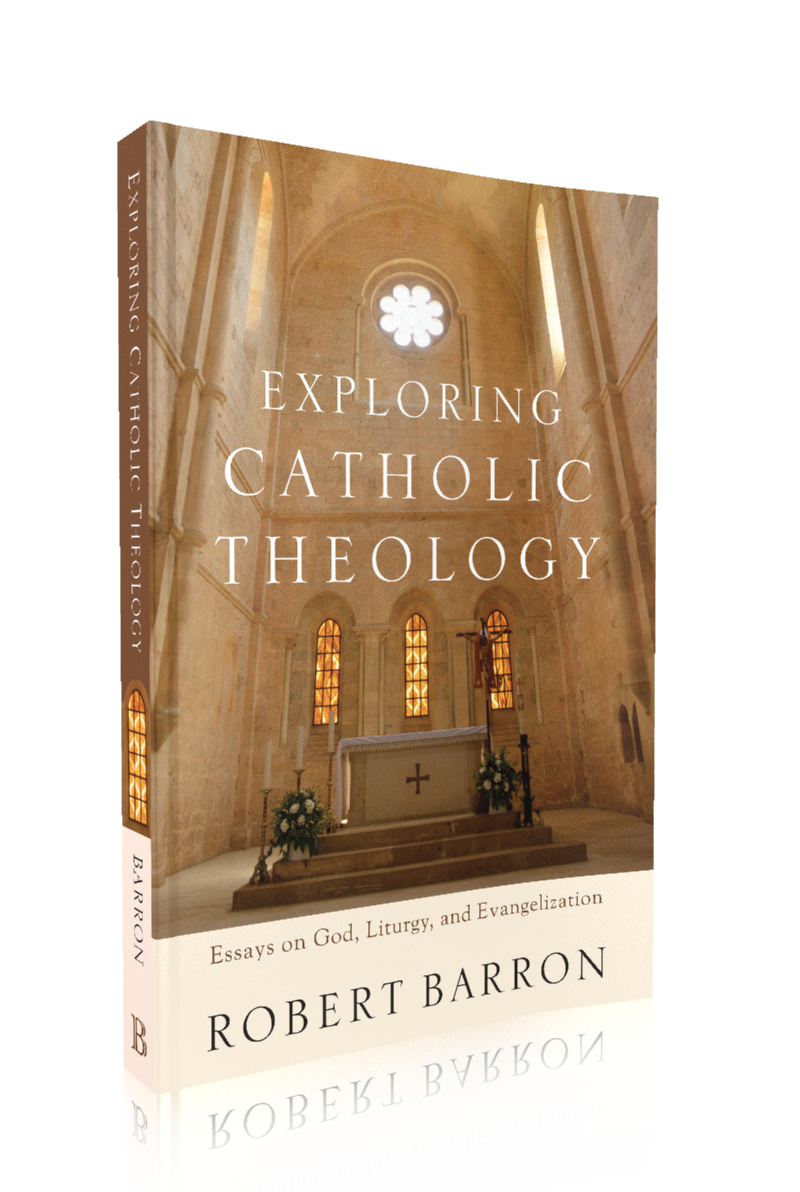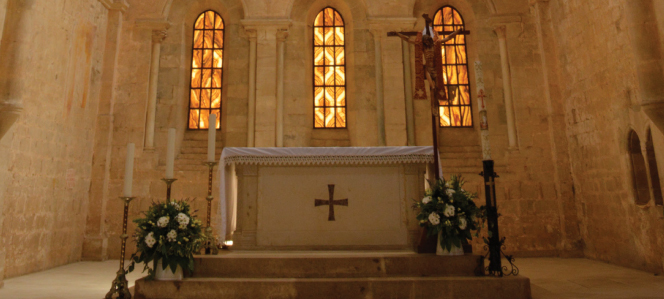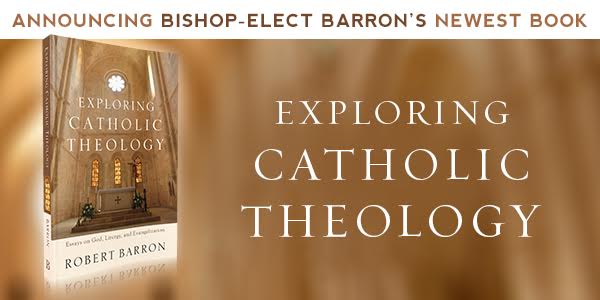On the heels of Pope Francis appointing Fr. Robert Barron auxiliary bishop of Los Angeles, we’re excited to announce Bishop-elect Barron’s newest book, Exploring Catholic Theology: Essays on God, Liturgy, and Evangelization (Baker Academic, 2015).
 In this book, Bishop-elect Barron sets forth a vision for an evangelical Catholic theology that is steeped in the tradition and engaged with the contemporary world. Striking a balance between academic rigor and accessibility, the book covers issues of perennial interest in the twenty-first-century church: who God is, how to rightly worship him, and how his followers engage contemporary culture.
In this book, Bishop-elect Barron sets forth a vision for an evangelical Catholic theology that is steeped in the tradition and engaged with the contemporary world. Striking a balance between academic rigor and accessibility, the book covers issues of perennial interest in the twenty-first-century church: who God is, how to rightly worship him, and how his followers engage contemporary culture.
Topics include the doctrine of God, Catholic theology, philosophy, liturgy, and evangelizing the culture. This work will be of special interest to readers concerned about the so-called “new atheism.”
Purchase Exploring Catholic Theology
Here is what some early readers have said about the book:
“Father Barron’s bracing, stimulating essays remind us that the ‘Church in permanent mission’ to which Pope Francis has called Catholics must be thoughtful as well as merciful, culture-challenging as well as culture-forming, intellectually sharp as well as pastorally sensitive.”
– GEORGE WEIGEL,
Author of “Evangelical Catholicism: Deep Reform in the 21st-Century Church
“In this book, Fr. Barron models the kind of pastoral theology and ressourcement envisioned by Vatican II. His is a theology founded on Scripture, tradition, and liturgy–but with windows open onto the world, engaging pop culture and high culture, politics and poetics, evangelicals and postmoderns, the new atheism and the old. Highly recommended, especially for pastors, scholars, teachers, and seminarians.”
– DR. SCOTT HAHN,
Mundelein Seminary; St. Paul Center for Biblical Theology
“These essays remind us how indispensable Fr. Barron is as a spokesman for the integrity and beauty of the Christian faith. He combines theological learning and depth with a remarkable gift for knowing what needs to be said–and how to say it.”
– R. R. RENO,
Editor, “First Things”
Table of Contents
Part 1 – Doctrine of God
1. Augustine’s Questions: Why the Augustinian Theology of God Matters Today
2. Thomas Aquinas and Why the Atheists Are Right
3. The Metaphysics of Coinherence: A Meditation on the Essence of the Christian Message
4. The Trinity on Display in the Economy of Salvation: An Irenaean Meditation
Part 2 – Theology and Philosophy
5. To See According to the Icon of Jesus Christ: Reflections on the Catholic Intellectual Tradition
6. A Tale of Two Cardinals: Avery Dulles’s Creative Engagement with the Thought of John Henry Newman
7. John Henry Newman among the Postmoderns
8. Biblical Interpretation and Theology: A Meditation on Irenaeus, Modernity, and Vatican II
Part 3 – Liturgy and Eucharist
9. The Eucharist as the Telos of the Law in the Writings of Thomas Aquinas
10. The Liturgical Self: An Exploration of Christian Anthropology in Light of the Liturgy
11. The Eucharist: Sacred Banquet, Sacrifice, Real Presence
Part 4 – A New Evangelization
12. Why Bernard Lonergan Matters for Pastoral People
13. Announcing the Lordship of Jesus Christ: The Evangelical Task within Contemporary Culture
14. From Correlation to Assimilation: A New Model for the Church-Culture Dialogue
15. To Evangelize the Culture
PURCHASE EXPLORING CATHOLIC THEOLOGY
Preface to Exploring Catholic Theology
Bishop-elect ROBERT BARRON
When I was a philosophy student at the Catholic University of America many years ago, I had the privilege of studying under Msgr. Robert Sokolowski, one of the great contemporary interpreters of Husserl’s phenomenology. Sokolowski’s master idea, grounded in the two natures doctrine of the Council of Chalcedon, is that God is non-competitively transcendent to the world, that is to say, that God is so radically other than creation that he can enter into what he has made in a non-intrusive manner. Sokolowski construed this insight as foundational for understanding a wide variety of Catholic doctrines, including creation, divine agency, providence, the sacramental economy, the Eucharist, etc.
As I have undertaken my own philosophical, theological, and evangelical projects, I have come back, again and again, to this seminal notion. I trust the essays in this collection on God make clear that the correct understanding of the nature of God is essential both for the engagement with the “new” atheism and the dialogue with the culture. As far as I can tell, every one of the avatars of the new atheism is busy swatting down the idolatrous notion that God is one important being among many, a denizen of the universe, “the biggest thing around,” competing with creatures on the same ontological playing-field. If they had bothered to read Thomas Aquinas with even a modicum of attention, they would have seen that the mainstream of the serious theist tradition agrees with them in rejecting such a fantastic entity. The true God, who is the sheer energy of to-be itself, is not a threat to human flourishing, but precisely the ground of human flourishing. St. Irenaeus’s adage, Gloria Dei homo vivens, expresses this notion admirably, and the image of the burning bush—a creature rendered radiant by the presence of God but not consumed—provides the Scriptural foundation for it. The Sokolowski clarification also illumines the faith/culture dialogue, for it allows us to see the unconditioned reality of God, not as a fussy intruder into cultural endeavors, but rather the ground and lure of those various attempts to seek the good, the true, and the beautiful. Paul Tillich commented that the Christian ought to go out to meet the culture mit klingindem Spiel (with fife and drum). It is the correct understanding of God that allows for such joyful confidence.
A number of essays in this collection suggest, however, that the faith/culture conversation within Catholicism had become skewed in the years following the Second Vatican Council. A correlational method had come to dominate Catholic reflection on fundamental theology, apologetics, and evangelization, and this in turn had allowed for the positioning of Christ by the questions surging up from human experience. But such a move is repugnant to the structuring logic of the New Testament, according to which Jesus, as the very Logos of God, is the norma normans sed non normata. Consequently, I have argued for an understanding of the faith/culture relationship along the lines suggested by John Henry Newman’s theory of assimilation. The Church, the body of Christ, takes to itself what it can from the cultural environment, even as it resists what it must. When Thomas Aquinas was critiqued for “diluting the wine of the Gospel with the water of Aristotle,” Thomas responded, “No, rather I am turning water into wine.”
Another major theme in this collection is liturgy, which is only natural for a Catholic theologian writing under the influence of the documents of Vatican II. In the magnificent text on the liturgy, Sacrasanctum Concilium, the council fathers said that the liturgy is the “source and summit of the Christian life,” implying that the Mass is the place where the “Catholic thing” is most thoroughly displayed and realized. If we want to understand who God is, who Christ is, who we are in relation to God, and what our mission and purpose might be, we look to the Eucharistic liturgy. This is, furthermore, precisely why the liturgy is so crucial in regard to the conversation with the culture. Peter Maurin, with Dorothy Day the co-founder of the Catholic Worker Movement, formulated the adage “cult cultivates the culture,” implying that the central prayer of the Church radiates outward and shapes the worlds of art, politics, economics, etc. Both the rabbis of the inter-testamental period and the Fathers of the Church interpreted Adam before the Fall as the prototypical priest and the Garden of Eden as a kind of primordial temple. The right praise offered by Adam was meant to infiltrate every aspect of life, coming in time to “Edenize” the world. This is the central idea that shapes the essays on liturgy.
From the very beginning of my career as a theologian and evangelist, I have staked out a position athwart what I have termed “beige Catholicism,” which is to say, a Catholicism drained of its distinctive coloration and texture, a Catholicism concerned, above all, with accommodating itself to the environing culture. Concomitantly, I have defended the paradox that the more we emphasize the Church’s uniqueness and doctrinal integrity, the more effectively the Church will engage and transform the culture. I have long stood against Schleiermacher’s apologetic strategy of giving speeches meant to convince skeptical critics that the faith, properly understood, is perfectly congruent with their own convictions and assumptions. I believe that classical Christianity, which holds to the divinity of Jesus, the facticity of the resurrection, and the efficacy of the sacraments, actually constitutes the greatest humanism ever proposed. The Church Fathers summed up this idea with admirable laconicism: Deus fit homo ut homo fieret Deus (God became human so that humans might become God, sharers in the divine life). No philosophy or ideology—ancient or modern—has ever proposed a more noble and thrilling vision of what human beings might attain.
I hope that the essays in this book, most of which were either published in academic journals or delivered as public lectures, might, when read together, provide a framework to help Christians think through some of the most pressing issues of our time.
PURCHASE EXPLORING CATHOLIC THEOLOGY

